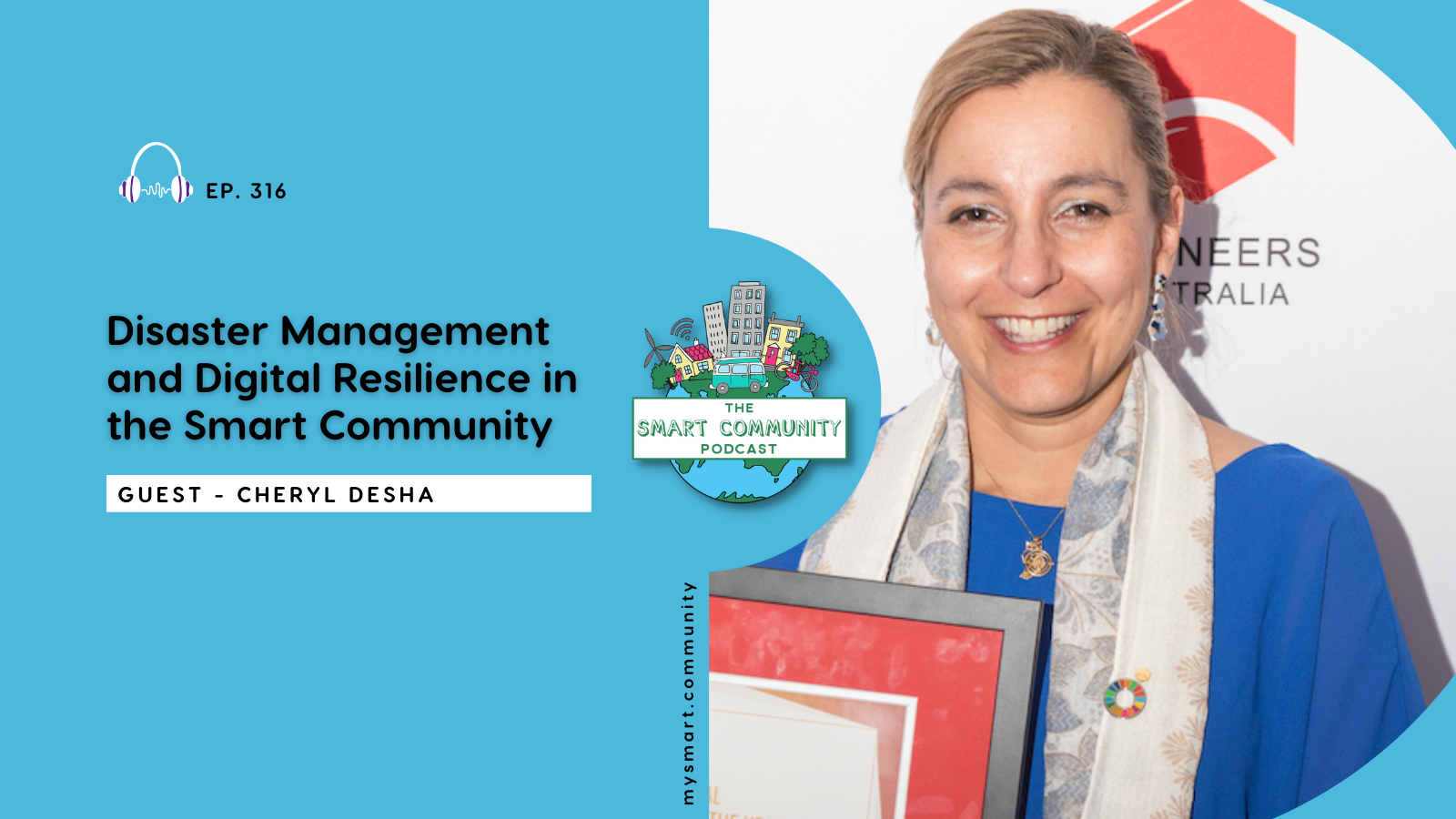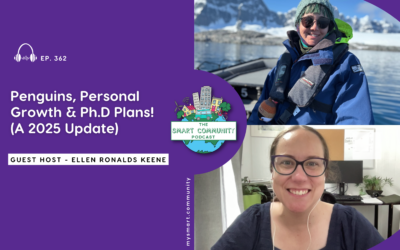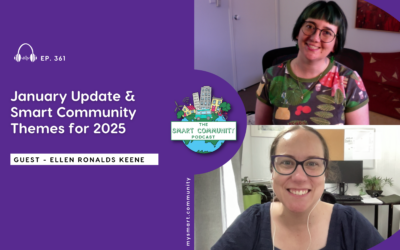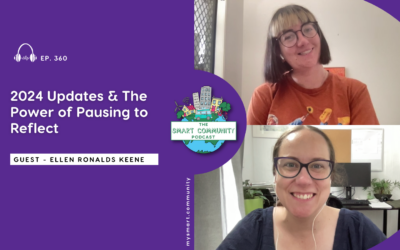Hi #SmartCommunity friends. In this episode of the Smart Community Podcast, I have a brilliant conversation with Cheryl Desha. Cheryl tells us about her background in Mauritius and Australia, and in Environmental Engineering, Disaster Management and Resilience. We discuss why resilience, including digital resilience, needs to be part of the Smart Community conversation, and how we can forward plan for better disaster management. Cheryl tells us about ways communities often come together in practical ways after disasters and how we can continue those positive aspects of community long term. We talk about how it’s important to balance the wonderful things about technology, such as data driven decision making and digital twins helping us be agile, with the way our digital junk food diet has reduced our ability to focus. Cheryl shares with us some of the projects she’s working on and some of the great books she’s been reading. We finish our chat discussing the emerging trend of the need for Digital Resilience in the Smart Community space. As always we hope you enjoy listening to this episode as much as we enjoyed making it!
Listen here:
What we cover in this episode:
- Cheryl’s background in Mauritius and Australia, and in Environmental Engineering, Disaster Management and Resilience
- Her passion for having systems that work and making better decisions through data
- What Cheryl does now and how she ended up in the role
- Why resilience, including digital resilience, needs to be part of the Smart Community conversation, and how we can forward plan for better disaster management
- The new normal and next level of adversity we are facing due to climate change and how she had to “forward-grieve”
- Ways communities often come together in practical ways after disasters and how we can continue those positive aspects of community long term
- Balancing the great things about technology (e.g. data-driven decision making and digital twins) with the way our digital junk food diet has reduced our ability to focus
- Some of the projects Cheryl has been working on and the great books she’s been reading
- The emerging trend of the need for Digital Resilience in the Smart Community space
Quotes:
“I’ve spent the last two decades writing about what’s going to happen, and talking with the most amazing human beings around the planet, as to their foresight and appreciation of what’s coming up this century. And that’s pretty grounding. I think my colleagues at the Natural Edge Project in our 20s and early 30s, we had to forward grieve, for want of a better expression, what’s about to go down [with climate change]. So, as I looked to that, I realized that this decade and next for me is around those really practical ways of enabling our decision makers to make better decisions.”
“We can continue towards doing sustainable development work in the face of ongoing adversity, and the new normal next level adversity in terms of climate change impacts that we’ve already put in place. We can’t do much about them. But we can live through them and mitigate further, and hopefully pop out the other side of that knot hole not too bruised or scarred.”
“Sometimes data can just sit there as white noise. How do you make that useful, like really meaningful information as digital Earth to then help us move forward? So the digital Earth and digital twins, all that kind of stuff that can help our human brains think more clearly, and more strategically about decision making.”
“We all rely so much on our Smart technology and real time sensor feeds and Wi Fi, that when we are in a situation of adversity, whether it’s flooding, fire, or a solar flare (which would knock out all of our telco, by the way.) Then that digital resilience becomes a really, really interesting conversation. So how do we forward plan digital resilience to help us during response and recovery?”
“[We now have] a digital junk food experience where our ability to focus is gone, like shattered. And it’s return-able if we focus on it, but the reality is that there’s no one telling us that it is a problem or that we should focus on it. So that distracted mindset doesn’t seek out community. The distracted mindset seeks out the next hit of pleasure.”
“It’s not just kids… actually, adults have too much tech these days and too much screentime. And not in the way that we’re talking about—tech for community building sense—but at a very individual level. I think it’s robbing us of the time that we used to take to create community and it’s robbing our kids now of even getting that childhood experience of community. And that’s really unsettling for my engineering brain and my social brain.”
“Obviously, we’re on a podcast, we’re having conversation, we’re going to record it’s going to be around for a while. But just the process of having this conversation is part of building community, it’s part of my community. And that’s why I find when I have these conversations, it’s the best part of my week.There’s no real outcome of this, we have a conversation and we put it out there. But actually, we don’t have to come to a conclusion. We just finished a conversation. And I think that’s also really important when we are pressed very much for that end result.”
“But actually at the moment, our decision makers are really tired. Even locally, in Queensland, for example, our State Disaster Center has been activated for nearly four years. And they’ve stopped counting how many days it’s been on without break. It’s just the new normal is that it’s always on. What does that mean for workforce? What does that mean for resourcing response and strategic planning? Well, that’s a whole new conversation.”
“Too often, I’m sitting in conferences and workshops with people talking about the piece of software that can provide real time decision support in the moment, so we don’t have to worry. And the alarm bell just goes off in my head that says, “What happens if that’s not there?” Because, if you put all your eggs in one basket, and that basket gets dropped, all the eggs break, and then you’re left with nothing. So yes, that’s great and what a fantastic opportunity to use that. And what’s our contingency plan for digital failure during disasters?”
Links:
Professor Timothy Foresman, QUT
Stolen Focus by Johann Hari
Sand Talk by Tyson Yunkaporta
Risk Starts and Ends with People by Lisa Sisson
Connect:
Connect with Cheryl on LinkedIn
Connect with me via email: hello@mysmart.community
Connect with My Smart Community via LinkedIn or Twitter and watch on YouTubePodcast Production by Perk Digital






Thank you so much Zoe and team for the opportunity to share through My Smart Community conversation! Looking forward to hearing from others who may be inspired to act on something they get from the podcast!
A wonderful dialog that allows for pragmatic hope and search for others who desire a prosperous and sustainable future.